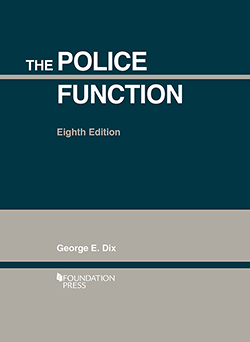- Home
- The Police Function
The Police Function
This casebook provides a detailed presentation of issues created by constitutional rules affecting law enforcement conduct and the exclusionary remedy for violations of those rules. It discusses such topics as arrests and stops of suspects for investigation, search and arrest warrants, permissible warrantless searches, interrogation practices, and lineups and other procedures related to eyewitness identification testimony.
Imprint: Foundation Press
Series: University Casebook Series
Publication Date: 03/17/2017
George E. Dix, University of Texas School of Law
CasebookPlus™
This title is available in our CasebookPlus format. CasebookPlus provides support beyond your classroom lectures and materials by offering additional digital resources to you and your students. Anchored by faculty-authored formative self-assessments keyed to our most popular casebooks, CasebookPlus allows students to test their understanding of core concepts as they are learning them in class – on their own, outside of the classroom, with no extra work on your part. CasebookPlus combines three important elements:
- A new print or digital casebook
- Access to a downloadable eBook with the ability to highlight and add notes
- 12-month access to a digital Learning Library complete with:
- Chapter questions keyed to the casebook
- Black Letter Law questions (available in select subjects)
- Subject area review questions for end of semester use
Leading digital study aids, an outline starter, and audio lectures in select subjects
Students can still utilize CasebookPlus digital resources if they’ve purchased a used book or are renting their text by purchasing the Learning Library at westacademic.com.
With CasebookPlus, you can customize your students’ learning experience and monitor their performance. The quiz editor allows you to create your own custom quiz set, suppress specific quiz questions or quiz sets, and time-release quiz questions. Additionally, the flexible, customized reporting capability helps you evaluate your students’ understanding of the material and can also help your school demonstrate compliance with the new ABA Assessment and Learning Outcomes standards.
This new edition follows the same organization and coverage of the last edition, except that it omits the brief subchapter on border-related law enforcement activity from the last edition to make room for new and more generally-applicable material. Cases and textual discussions from the supplement to the last edition are integrated into the casebook itself. Some presentation of earlier decisions has been reduced. New York v. Belton, for example, has been omitted as adequately presented in an expanded version of Arizona v. Gant. The thrusts of case law since the last edition dictated an explanation of some areas of coverage, such as traffic stops (now including Rodriguez v. U.S.), searches incident arrest (now including Riley v. California), and exigent circumstances searches (now including Missouri v. McNeely). The new edition retains, of course, many of the classic principle cases, including (among many others) Mapp v. Ohio, Wong Sun v. United States, Florida v. Royer, Franks v. Delaware, Chimel v. California, Schneckloth v. Bustamonte, Miranda v. Arizona, and United States v. Wade.
Learn more about this series.
Access Denied
Law School Faculty - Sign in or Create an Account to access this content. Law faculty who have created an account can sign in after receiving email notification that registration has been approved. Email accountmanager@westacademic.com or call 800-313-9378 for assistance.
Other Higher Education Faculty who wish to access digital review copies or teaching resources should contact their West Academic Account Manager at college@westacademic.com or 800-360-9378.
Adopters Only
This content is intended for adopters only. Sign in or Create an Account to access this content. Law faculty who have created an account can sign in after receiving email notification that registration has been approved. If you are an adopter who is unable to access this content after signing in, contact your account manager for assistance at accountmanager@westacademic.com or call 800-313-9378 for assistance.
Access Denied
Sign in or Create an Account to access this content. Faculty who have created an account can sign in after receiving email notification that registration has been approved. Contact us for assistance.
Law School Faculty: email accountmanager@westacademic.com or call 800-313-9378.
Other Higher Education Faculty: email college@westacademic.com or 800-360-9378.
Access Denied
Higher education faculty who wish to view this document should contact their West Academic Account Manager at college@westacademic.com or 800-360-9378.
